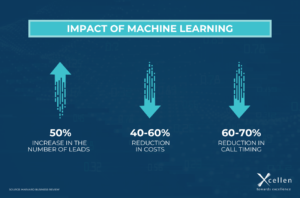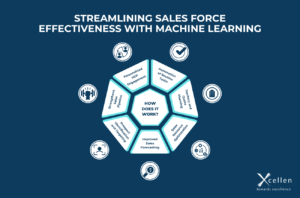Introduction
Sales force effectiveness remains one of the top priorities of pharma and life sciences organizations. However, to achieve this, organisations have to overcome the overwhelming complexity of the data that comes their way. From customer demographics to product information and market trends, sales teams are inundated with vast amounts of data, making it challenging to extract meaningful insights and make informed decisions. This influx of data comes in different formats, at different speeds, and from diverse channels, making it incredibly complex to manage and utilize effectively.
Traditional methods often fall short due to their time-consuming and human-intensive nature. The intricate nature of the data that sales teams encounter daily is too complex to rely on only human computation. It requires technological intervention that can drive faster and more precise results. This is where machine learning has revealed itself as a great way to address the concerns faced by organisations in terms of data complexity.
Understanding Data Complexity in Pharma Industry
To fully understand the role of machine learning in streamlining sales forces, one needs to dive deep into the nuances of data complexity and the significance of real-world data (RWD). Integrating RWD at several points of the pharma value chain can enhance sales strategy and facilitate easy market access. Without the right tools to tackle this complexity, sales teams risk being overwhelmed and missing out on valuable insights that could drive overall growth and revenue.
According to a recent McKinsey article, in the next 3–4 years, on average, the top 20 pharmaceutical companies are likely to release over $300 million annually just by implementing RWD across their value chain. Realising this power of real-world data and taking the necessary steps to leverage it can impact overall business performance and help companies achieve commercial excellence.
As data complexity increases, multiple challenges related to data quality can emerge, which may constrain the application and utility of real-world evidence (RWE). For instance, biases in the data and other underlying quality issues can be difficult to identify and may restrict the insights that can be drawn from such data. Let’s explore why the integration of technological intelligence, such as machine learning, is imperative to gain a competitive advantage.
Volume, velocity, and variety of data
Real-world experience (RWE) and real-world data (RWD) are at the disposal of the sales team at a pace never seen before. While the increasing diversity of data offers opportunities to make better decisions and strategies, it also requires a more sophisticated methodology for data analysis. The sheer volume of data in itself can be a daunting task to compile and process without technological interventions.
Dynamic nature
Moreover, the dynamic nature of the industry adds another layer of complexity. Market trends shift rapidly, regulations evolve, and competitor strategies change—all of which contribute to the volatility of data. Sales teams must navigate through this ever changing landscape to identify opportunities, mitigate risks, and tailor their approach to meet the evolving needs of their target audience.
Data quality
Once data is procured, it has to be assessed in terms of quality. The extent to which a data set is reliable depends on its inherent quality and coverage, as well as how it is intended to be used. And in such cases, it is common to find outliers and missing data points when considering the volume of information. Using machine learning algorithms or automated analyses can result in significant savings for the company while detecting data anomalies.
The Role of Machine Learning in Managing Data Complexity
Machine learning (ML) is a subset of artificial intelligence (AI) that enables computers to learn from data without being explicitly programmed. Instead of relying on predefined rules or algorithms, machine learning algorithms iteratively analyze data, identify patterns, and make predictions or decisions based on the insights gained. This ability to learn from data empowers machines to improve their performance over time, making them invaluable tools for processing and extracting insights from complex datasets.

So, how do machine learning algorithms handle complex datasets more effectively than traditional methods?
Well, traditional analytics primarily rely on predefined rules and statistical techniques to analyze historical data and derive insights. While this works in the case of structured datasets and well-defined problems, this method often struggles to handle the volume, velocity, and variety of data characteristic of modern sales environments. Machine learning, on the other hand, excels at processing large volumes of data, identifying patterns, and making predictions.
According to a Harvard Business Review article, sales teams that have adopted AI & ML are experiencing significant improvements in their performance. Teams have seen an increase in the number of leads and appointments generated by over 50%. Additionally, they are achieving cost reductions between 40% and 60%, as well as reductions in call times ranging from 60% to 70%.
Leveraging Machine Learning for Sales Force Effectiveness
In the evolving world of sales, where efficiency and agility are paramount, machine learning offers a suite of tools and capabilities to streamline processes. From automating routine tasks to providing real-time insights, it empowers sales teams to achieve greater productivity and success.

Automation of Routine Tasks
Sales representatives often spend a significant amount of time on repetitive administrative tasks such as data entry, scheduling appointments, and updating CRM records. Machine learning-powered automation tools can free up valuable time for sales professionals to focus on high-value activities that actually require or demand human intervention.
Prospect Identification and Targeting
Machine learning excels at pattern recognition to help sales teams identify the highest potential new healthcare provider (HCP) prospects. By matching HCP data profiles to those of the most valuable existing customers, sales reps can more effectively target the most promising leads.
Personalized HCP Engagement
Personalization is key in today’s world. By leveraging ML led predictive models, sales reps can gain deeper insights into HCP preferences, behaviours, pain points, prescribing habits, and stages in the buying journey. This enables pharma sales teams to personalize their outreach, content, and engagement strategies for each healthcare provider, leading to higher conversion rates.
Improved Sales Forecasting
Predictive analytics powered by machine learning to analyze historical sales data, market trends, patient demographics, and other relevant factors. This can enable pharma sales teams to forecast future sales more accurately, allowing for better pipeline planning, budgeting, and resource allocation.
Territory and Quota Planning
Machine learning-based predictive modelling can optimize sales territory assignments and set realistic, data-driven quotas for individual sales reps or regions. This can improve overall sales performance and ensure an equitable distribution of opportunities.
Strengthens Sales Pipeline
ML led lead scoring and nurturing can guide sales and marketing teams to convert Marketing Qualified Leads (MQLs) into Sales Qualified Leads (SQLs), ultimately strengthening the sales pipeline. It helps leads move through the sale pipeline with more ease using insights from third-party data and natural-language processing (NLP) refining the lead scoring model and identify the most engaged and interested prospects.
Sales Resource Optimization
It can be applied for sales engineer scheduling, sales enablement support, and time allocation to focus on the most high-value HCPs or accounts. When combined with predictive analytics, pharma companies can accurately forecast demand, plan inventory levels, and allocate sales, marketing, and support resources more effectively. This can help them minimize waste and ensure product availability.
Overcoming Challenges and Pitfalls
While the potential benefits of implementing machine learning in sales are significant, it’s essential to address the challenges and pitfalls that may arise along the way. From data privacy concerns to integration issues with legacy systems, navigating these obstacles is crucial for ensuring a successful implementation.
Data Privacy and Security Concerns
As machine learning algorithms rely heavily on data, ensuring data privacy and security is paramount. Sales organizations must comply with regulations to protect customer data and maintain trust. Implementing robust data encryption, access controls, and anonymization techniques are essential steps in safeguarding sensitive information while harnessing the power of machine learning.
Integration Issues with Legacy Systems
Integrating machine learning capabilities into existing sales systems and workflows can pose challenges, particularly when dealing with legacy systems and disparate data sources. Compatibility issues, data format mismatches, and limited API support may hinder seamless integration efforts. Organizations must invest in robust integration solutions and expertise to effectively bridge the gap between legacy systems and modern machine learning technologies.
Ensuring Data Quality and Accuracy
The effectiveness of machine learning models depends heavily on the quality and accuracy of the underlying data. Inaccurate, incomplete, or biased data can lead to unreliable predictions and suboptimal outcomes.
By proactively addressing these challenges and pitfalls, sales organizations can mitigate risks and maximize the benefits of implementing machine learning in their operations.
Moving Forward
As technology continues to advance, the future of sales force effectiveness holds exciting possibilities for innovation and evolution. The importance of embracing machine learning in sales cannot be overstated. Businesses that fail to adapt to the evolving landscape risk falling behind competitors and missing out on valuable opportunities.
We can expect to see a continued emphasis on data-driven decision-making and personalized customer experiences. Machine learning will play a central role in enabling sales teams to analyze vast amounts of data, identify trends and patterns, and deliver targeted messaging and offers to individual customers. Additionally, advancements in predictive analytics and forecasting will enable sales organizations to anticipate customer needs and market trends more accurately, giving them a competitive edge in the marketplace.
Innovations in areas such as natural language processing (NLP), image recognition, and deep learning will enable sales teams to extract deeper insights from unstructured data sources and improve decision-making processes.
AI-powered virtual assistants, or chatbots, are becoming increasingly prevalent in sales and customer service applications. These virtual assistants leverage machine learning algorithms to understand and respond to customer inquiries, provide personalized recommendations, and automate routine tasks such as appointment scheduling and order processing.
By adapting to these emerging trends and technologies, organizations can stay ahead of the curve and continue to deliver exceptional value to their customers.





